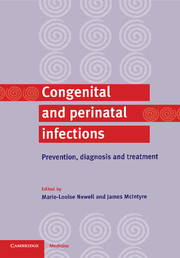Book contents
- Frontmatter
- Contents
- List of contributors
- Preface
- Part I General issues
- Part II Specific infections
- 5 Rubella infection in pregnancy
- 6 Perinatal Group B streptococcal infections
- 7 Mother-to-child transmission of cytomegalovirus
- 8 Varicella
- 9 Herpes simplex
- 10 Vertical transmission of hepatitis viruses
- 11 Papillomavirus infections as a perinatal problem: diagnosis, prevention and management
- 12 HIV-1 infection
- 13 Syphilis: prevention, diagnosis and management during pregnancy and infancy
- 14 The other sexually transmitted diseases
- 15 Toxoplasmosis
- 16 Neonatal sepsis
- Index
6 - Perinatal Group B streptococcal infections
Published online by Cambridge University Press: 06 July 2010
- Frontmatter
- Contents
- List of contributors
- Preface
- Part I General issues
- Part II Specific infections
- 5 Rubella infection in pregnancy
- 6 Perinatal Group B streptococcal infections
- 7 Mother-to-child transmission of cytomegalovirus
- 8 Varicella
- 9 Herpes simplex
- 10 Vertical transmission of hepatitis viruses
- 11 Papillomavirus infections as a perinatal problem: diagnosis, prevention and management
- 12 HIV-1 infection
- 13 Syphilis: prevention, diagnosis and management during pregnancy and infancy
- 14 The other sexually transmitted diseases
- 15 Toxoplasmosis
- 16 Neonatal sepsis
- Index
Summary
Introduction
Infection is a major cause of perinatal morbidity and mortality (Christensen, 1982; Ohlsson et al., 1987). The aetiology of neonatal septicemia varies with geographical location and changes over time (Nyhan & Fousek, 1958; Ohlsson & Serenius, 1981; Ohlsson et al., 1986). From the 1960s onwards, Group B beta-haemolytic streptococcus (GBS) has been one of the most common causes of neonatal infectious morbidity and mortality in the USA (Eickhoffet al., 1964; Franciosi et al., 1973; McCracken, 1973), Canada (Allardice et al., 1982), the UK (Reid, 1975; Lloyd & Reid, 1976), Europe (Cayeux, 1972, Bergqvist, 1974; Bergqvist et al., 1978; Schroder & Paust, 1979; Speer et al., 1985; Vesikari et al., 1989) and Australia (Fliegner & Garland, 1990). GBS causes significant maternal perinatal morbidity (Institute of Medicine, 1985), bacteriuria in pregnancy (Hastings et al., 1986) as well as urinary tract (Munoz et al., 1992) and other infections in the adult non-pregnant population (Opal et al., 1988; Schwartz et al., 1991).
Historical background
Rebecca Lancefield described in 1933 a serological method for differentiating the haemolytic streptococci into a number of groups (Lancefield, 1933). At that time most severe streptococcal infections in the puerperium were caused by streptococci belonging to Group A (Charles & Larsen, 1986). In 1935 GBS was reported as a cause of mild puerperal infection (Lancefield & Hare, 1935), followed by a report of three cases of fatal GBS puerperal infection (Fry, 1938). GBS was subsequently confirmed as an important pathogen in the perinatal period (Nyhan & Fousek, 1958; Eickhoffet al., 1964; Franciosi et al., 1973; Hood et al., 1961).
The organism
The GBS, or Streptococcus agalactiae, is a Gram-positive diplococcus. The majority of strains (99%) are beta-haemolytic.
- Type
- Chapter
- Information
- Congenital and Perinatal InfectionsPrevention, Diagnosis and Treatment, pp. 96 - 121Publisher: Cambridge University PressPrint publication year: 2000
- 4
- Cited by



